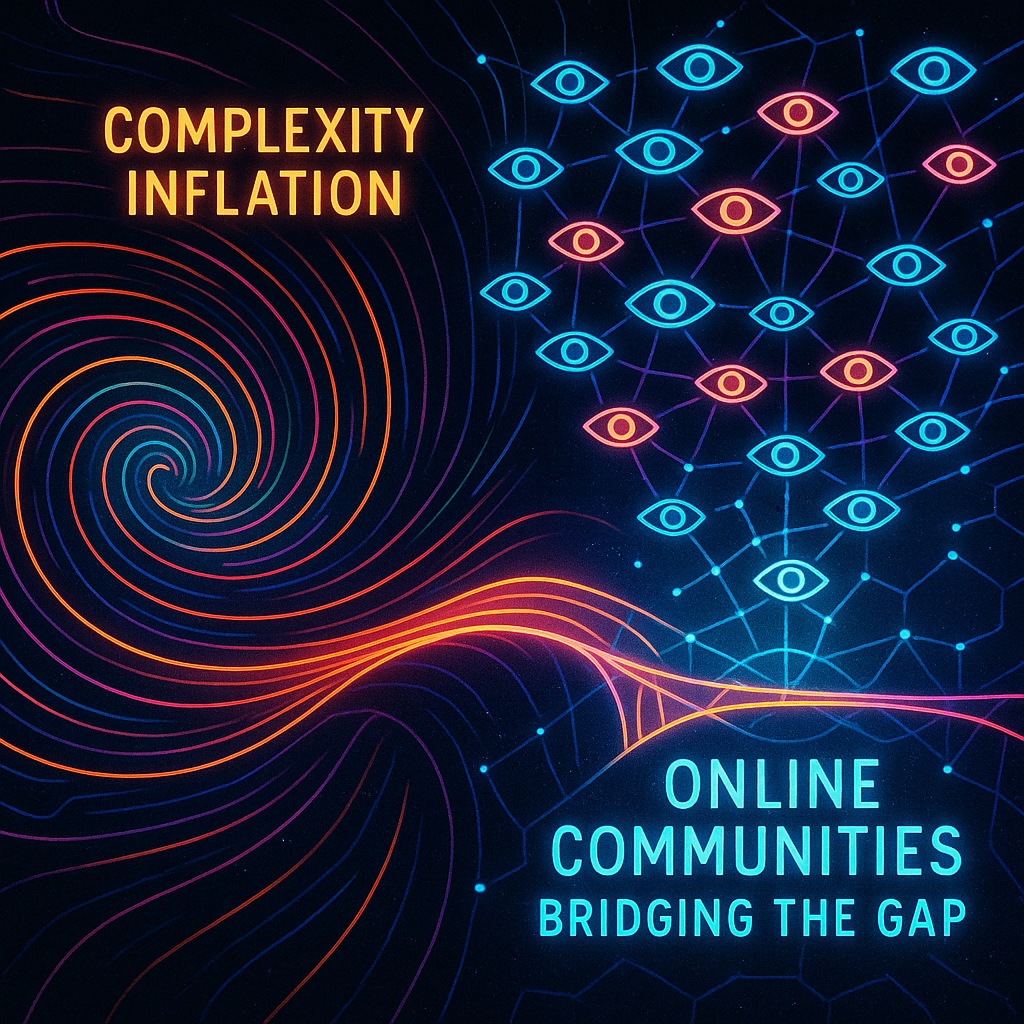Mind-Share Overload: How Online Communities Bridge the Recognition Gap in an Age of Complexity Inflation
“When the world’s problems scale exponentially, the only thing that can keep pace is a network of eyes.”

“When the world’s problems scale exponentially, the only thing that can keep pace is a network of eyes.”
1 | Complexity Inflation: The New Gravity Well
Every decade used to come with a discrete leap in tools—steam, electricity, silicon.
Now micro-leaps arrive weekly: new LLM releases, cryptographic primitives, biotech protocols. Each upgrade spawns-a-thousand forks, integrations, edge-cases. The result is complexity inflation—a compounding density of moving parts that outpaces the human attention budget.
| 1995 | 2005 | 2015 | 2025* |
|---|---|---|---|
| Static webpages | LAMP stacks | Cloud microservices | AI-orchestrated, zero-trust, multi-chain apps |
*Projected; next week may already top it.
When everything is a layered abstraction, individual contributions blur inside the stack. Traditional recognition channels—manager hierarchies, annual conferences, peer-review cycles—simply can’t index the explosion of niche value. That’s the recognition gap.
2 | Why Online Communities Are Uniquely Suited to Close the Gap
- Sharded Attention
Communities function like distributed hash tables for expertise. Each subreddit, Discord, or DAO node “owns” a shard of the knowledge graph, making microscopic contributions discoverable where they’d be invisible in a corporate org chart. - Rapid Context Compression
Meme culture isn’t just jokes; it’s lossless compression for high-context ideas. Inside a niche server, a four-word emoji-laden comment can encode a 30-page white-paper’s worth of priors—instant recognition without the slide deck. - Peer-Validated Attributions
Git blame, forum edit histories, on-chain attestations: communities reward with verifiable trails rather than HR summaries. Proof-of-contribution becomes the default social currency. - Hierarchical Modularity
Online spaces recursively nest (think r/MachineLearning → /image-diffusion-subchannel → /samplers thread). This fractal topology mirrors complexity, matching granularity of recognition to granularity of work. - Memetic Amplification Loops
When a community spotlights a breakthrough, that signal ricochets across aligned tribes, compounding reach. Recognition is no longer a zero-sum resource allocated by gatekeepers; it’s an amplifiable meme.
3 | Design Principles for Recognition-Native Communities
| Principle | Practice | Payoff |
|---|---|---|
| Observable Workflows | Default-public logs, livestreamed pair sessions | Newcomers see value creation in real-time, not post-facto |
| Atomic Credentials | Task-level NFT attestations, signed git notes | Contributors carry portable proof across projects |
| Reputation Stacking | Layer soft-signals (emoji, upvotes) with hard-signals (bounties, badges) | Multidimensional profile resists single-metric bias |
| Entropy-Driven Discovery | Highlight the most uncertain open questions—not the loudest threads | Channels stay problem-centric, not personality-centric |
| Calibration Rituals | Monthly “demo-day” or “merge-parade” where the room audits proofs | Keeps recognition grounded in evidence, not vibe alone |
These map directly onto the Memetic Recognition Stack: identity → contribution → evaluation → amplification. Communities can run the entire stack natively, minute-by-minute, while firms outsource half of it to annual reviews.
4 | How Employers & Ecosystems Benefit
- Talent Radar Communities surface edge-case specialists (e.g., zero-knowledge circuit optimizers) months before recruiters notice the skill exists.
- Faster Experiment Cycles Ideas vetted in public channels hit product backlogs with built-in user feedback.
- Trust Portability Auditable community badges let freelancers carry social capital across contracts, reducing due-diligence friction.
- Resilience When a project spans companies and continents, the community ledger of recognition becomes the single source of truth if any one org implodes.
5 | Call to Action: Build or Join a Recognition Engine
- Map Your Niche Find—or found—the Discord, forum, or DAO that obsesses over your slice of complexity.
- Instrument Contributions Log everything: screencasts, code diffs, decision threads. Future you (and future recruiters) will thank you.
- Ritualize Calibration Schedule open audits; refuse silent merges. Shine light on micro-insights before they calcify into invisible infrastructure.
- Reward Observers Too Spotters, curators, meme-smiths amplify recognition; give them explicit credit.
- Export Proof Push attestations on-chain or into any immutable store. Recognition that can’t travel isn’t recognition; it’s applause trapped in a room.
6 | The Road Ahead
Complexity inflation isn’t slowing. If we don’t upgrade our recognition machinery, the gap widens, and invisible genius silently burns out. Online communities are our adaptive optics—thousands of micro-lenses sharpening the image of who did what, when, and why it mattered.
Build those lenses now, and the next wave of breakthroughs won’t just happen—they’ll be seen.
